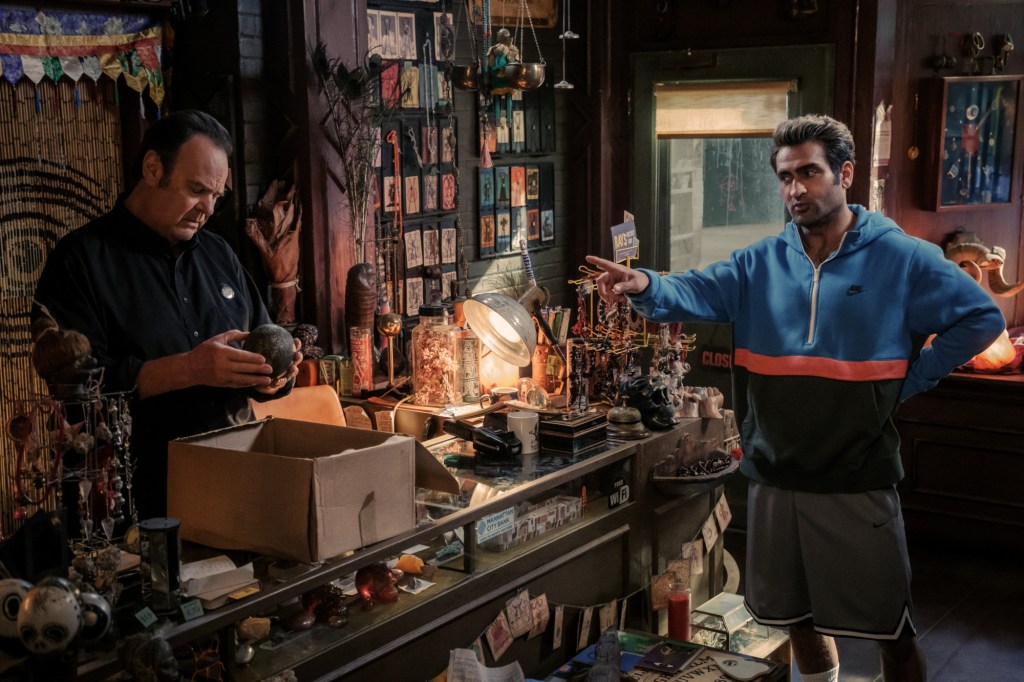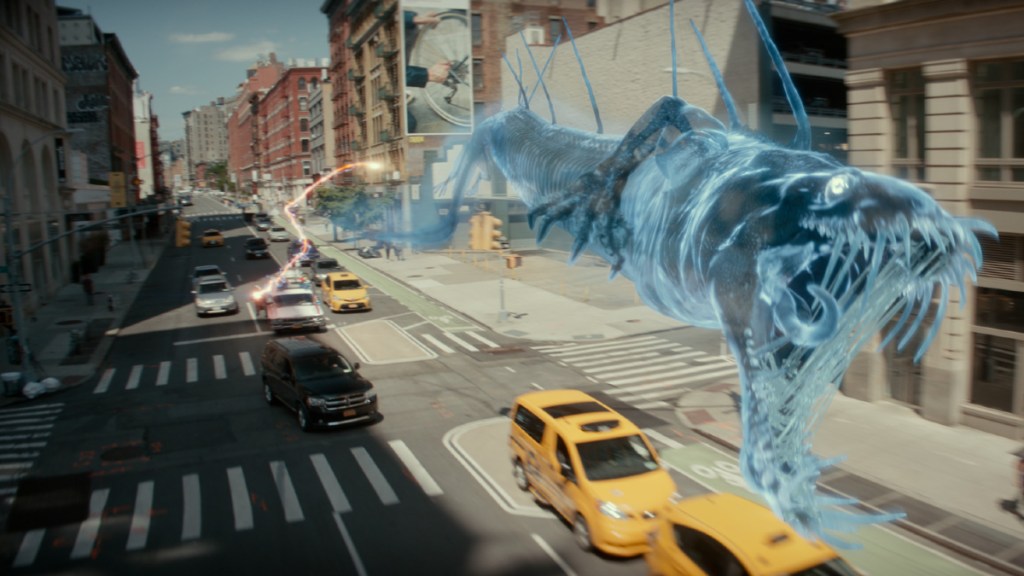Ghostbusters is a tough property to sequelize in a way that makes anyone happy. The fans want callbacks, but not too many. The original actors make it difficult, then sometimes change their minds. The balance of comedy with scares never quite seems to please anyone. And to what extent should any new installment draw on the well-liked animated series, the Real Ghostbusters? The 1984 original was lightning in a bottle, perfectly blending Saturday Night Live-style, adult-ish comedy with the latest state-of-the-art special effects and Dan Aykroyd‘s real-life obsession with the paranormal, with a touch (but not too much) of director Ivan Reitman’s libertarian politics, comically exaggerated.
And Then?
It’s safe to say none of the sequels (we’ll count the 2016 remake, also known as Answer the Call, as one, in a multiversal sense) has quite measured up, but nor should they try. Paul Feig, Jason Reitman, and now Gil Kenan are not Ivan Reitman, and for better or worse bring their own particular worldviews to the table. Feig came closest to duplicating the Saturday Night Live dynamic but with fewer scares, the younger Reitman wrestled with nostalgia and family legacy, and Kenan…likes families menaced by haunted houses, as Monster House and his Poltergeist remake attest.

The elder Reitman’s Ghostbusters II felt overly pressured to pander to the youngest fans of the then-mega-hot animated series; now that all those kids are grown up, Kenan can safely draw on that vibe without feeling overly family safe. The new ghost villain, Garraka, feels like something the cartoon might have come up with, but with the ability to actually kill innocent victims, something ’80s Saturday morning TV could never have allowed. (And yet we also had Rambo and RoboCop cartoons…Go figure!) A horned demon with no personality traits beyond being ultimate evil, this is a supernatural, Satanic terminator who cannot be reasoned or bargained with. No jokey Marshmallow Man guises or god taunts here — just deadly ice spikes and cryogenic attacks.
Peck and the Cheek
That’s not to say there aren’t funny ghosts, as some familiar faces and all-new ectomorphs enliven the proceedings and make things more difficult for our heroes, who have it hard enough now that the “dickless” former EPA man Walter Peck (William Atherton) is mayor of New York City. The Ghostbusters, now funded by their deep-pocketed veteran Winston Zeddemore (Ernie Hudson) consist of field operatives in the form of the firehouse-dwelling Spengler family (plus Paul Rudd‘s Gary, who’s not yet officially part of it), and a tech crew back at a more secret corporate headquarters.
They’re too successful to easily shut down, but Peck sees his chance in the underage Phoebe (Mckenna Grace) being part of the team, and thereby violating child safety and labor laws. For the good of the group, then, she has to be placed on time out from overt participation.

An emerging new wave of ghosts keeps everyone busy and puts the containment unit under considerable strain; it was never meant to last forty years or be infinitely fillable. Meanwhile, Ray (Dan Aykroyd) and Podcast (Logan Kim) have become Internet-famous for a sort of haunted version of Antiques Roadshow, which ultimately brings into their possession an ancient orb containing — what else? — the new big bad that must never, ever be unleashed (but, of course, will).
Sapphic Spectre?
Unable to directly assist, Phoebe secretly befriends a glamorous, blonde teenage ghost named Melody (Emily Alyn Lind) in what feels like a not-so-coded burgeoning queer romance. It’s especially so when Phoebe fantasizes about leaving her body, so she can be on the ethereal plane, where they can touch.
The movie’s not quite so bold as to come out and say it, but we’re talking Disney’s Elsa-level subtext, and perhaps it’s no coincidence that both their movies use freezing and melting as a metaphor. By movie’s end, Podcast has pointedly lost interest in Phoebe, in favor of an unnamed female fan.
Crowded Firehouse
Kumail Nanjiani and Patton Oswalt show up to do more or less the kind of stuff you’d expect them to do; more interesting is the less-known UK comic James Acaster as Lars, Winston’s main tech guy. Unlike Phoebe, who’s coded slightly on the spectrum, Lars is just an anti-social nerd and suffers the most narrative indignities for it.

With these additions, plus the old and new primary cast members, there are almost too many major characters. Madame Web’s Celeste O’Connor again gets very little to do in a major franchise movie this year as Lucky; the Lars role could have gone to them, with Acaster taking Oswalt’s place, and little would be lost. Bill Murray‘s Venkman is even more Murray than ever, showing up randomly in the plot wherever and whenever he pleases, especially if there’s a free drink involved. Aykroyd’s clearly as delighted to be back in a passion project as Ray is to be bustin’ again, and Hudson, whose star (unfairly) never rose as high in Hollywood, remains the realist. Of the OG’s, only Annie Potts’ Janine still feels like a separate character from the performer, and we never do learn what happened to her and Louis.
Family or Bust
As the primary adults in the room, Callie (Carrie Coon) and Gary (Paul Rudd) make potentially generic parts into more than just what’s on the page. Their interplay is inspired, and the fact that they’re unashamed that they kicked off their romance by having sex while possessed by hellhounds is, at the very least…refreshingly unprudish? Finn Wolfhard is more generic as a sulky 18-year-old, but at least he gets to do so in scenes with Slimer, treating the classic green gobbler as the world’s most intransigent, messy roommate. Phoebe is less funny this time around and more of a tragic figure; as an adolescent, she is, in fact, the smartest person around and not just someone who feels that way, which makes her targeted by both the mayor and the evil Garraka feel doubly unfair. As teenage traumas often do.

Ghostbusters: Frozen Empire runs almost two hours and feels overlong — it’s more or less a two-part episode of the TV cartoon, padded out with extra shtick so everyone has at least something to do. The callbacks, such as they are, feel less forced: Slimer and the Library Ghost get very little screen time, and if the Mini-Pufts maybe get more than they need, well, at least their cartoonish madness makes for good sight gags, even if they make zero sense without Gozer.
Good Enough
Yet all involved feel loose and improv-ready — this is a less well-oiled machine than the original, but there’s a vibe throughout that everyone trusts each other to riff and work together. Nobody feels like they were bribed to show up or shoehorned in by mandate…again, except maybe the Mini-Pufts, because when you have murderous versions of the Minions, but in little hats, they will make money. Even people who have never watched the movie will buy the plushies, guaranteed.
Frozen Empire is arguably “just” a sequel to Ghostbusters, but that in itself is an achievement because, in a way, we’ve never actually had one before. Ghostbusters II was made begrudgingly by some involved and had to serve too many masters, Answer the Call re-started from scratch while standing up to insane and partially dishonest misogyny, and Afterlife needed to both eulogize Harold Ramis and reboot the series, legacy style. Frozen Empire, simply by getting the existing gang back together to have fun doing the thing they do, is deceptively miraculous in that regard. That doesn’t make it a new classic, but it does keep it a decent franchise installment, with surprisingly poignant moments and metaphors when the focus is on Phoebe.
[Note: there is a mid-credits scene, but it’s skippable, and doesn’t really hint at anything to come.]
Grade: 3.5/5
Ghostbusters: Frozen Empire opens March 22 in theaters.









